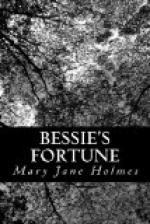After his death there was nothing to relieve the tedium of Hannah’s life, and but for her trust in God her reason must have given way under the strain, for it was not only her own sorrow, but her father’s as well, which she had to bear. With him there was no rest, day or night, and every breath was a prayer for mercy and forgiveness.
At first he was continually haunted with a fear of detection, and frequently in the night he would steal noiselessly to Hannah’s room, and awakening her with a whisper, tell her there were men about the house, come to arrest him, and charge her with having broken her oath and betrayed him into the hands of the law. Every possible precaution against a surprise was taken. Iron bolts were put on the doors, the windows were nailed down, and the house was never for an hour left alone. The people said the man was deranged, and pitied the young girl who, from daily association with him, was becoming almost as peculiar as himself.
After a few years the aged pastor, who had so long officiated in the stone church on the common, died, and the Rev. Charles Sanford, fresh from the Theological Seminary, was called to take his place. Full of energy and zeal in his work, the young rector soon made himself acquainted with all his parishioners, and seemed to find a peculiar attraction in the inmates of the farm-house, where he spent a great deal of time, arguing with the father on the nature of the unpardonable sin, and answering the many questions his host propounded to him upon the subject of genuine repentance and its fruits, and how far confession to man was necessary that one might be saved.
To these discourses Hannah was always an attentive listener, and there came gradually a new light into her dark eyes, and a faint color to her white cheeks, when she saw the rector coming up the walk, and met his winning smile. But all this was ended at last; for, after a night in June, when she walked with the young clergyman through the pasture land under the row of chestnut trees which grew upon the hill-side, he came less frequently to the farm-house, and when he did come his discourse was mostly with her father, whom he was laboring to convince that it was his duty to be confirmed. But Peter always answered him:
“No, you don’t know what you ask. I am too vile, too great a sinner for that. The very stones would cry out against me.”
The clergyman thought him crazy, and after a time abandoned the effort, and went but seldom to the farm-house, where Hannah had again entered the dark cloud in which his coming had made a rift, and which now seemed darker than ever, because of the momentary brightness which had been thrown upon it. She, too, had labored with her father as Mr. Sanford had done, telling him of the peace which was sure to follow a duty performed, but he answered her:




